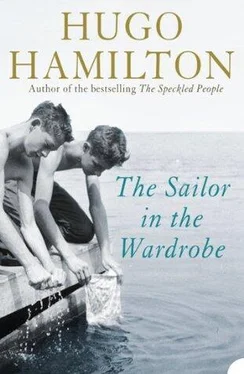And then we saw somebody walking towards the harbour, a man brightening up and falling into shadow again as he passed under the street lights on the pier.
‘Hark,’ Packer said, and I started laughing.
Packer punched my shoulder to keep me quiet. We put our heads down to stay out of sight. The pier was behind me, so I left it to Packer to put his head up every now and again to see who it was, if we could recognize him. The man stood behind the upturned boat that was still being painted. He stood behind the crane for a moment, then moved forward to the edge of the pier.
‘It’s Tyrone,’ Packer whispered.
We had got our man. I could already see us talking to Dan and talking to the Gardai. I could imagine them taking Tyrone away for questioning.
‘He’s coming,’ Packer said.
We watched Tyrone bending down to untie the ropes on the pier, then pulling the boat in and going down the steps. We saw him getting into the boat, his own boat. He was standing up and he stopped for a moment to pull a bottle out of his pocket and drink from it, before he picked up the oar and began to scull his way along the pier. He was coming right towards us. I thought he knew that we were there all the time and that he was quietly coming to get us, that he would hit us with the oar or shout to let us know he was no fool and he knew what we were up to. For one moment, he was right beside us, standing up, talking to himself, humming.
At the harbour mouth, he sat down and took out the second oar, then started rowing out slowly without a sound. He was so skilled at dipping the oars into the water each time, that they made no more noise than the water lapping against the granite steps. We had put him on trial. He was doing nothing other than taking out his own boat, slipping quietly out of the harbour, but we had already found him guilty.
‘Let out the fuckin’ deabhailín,’ Packer whispered.
And then we started laughing so much that we could not even move. I had to put my head down on the seat of the boat because I was shaking so much and laughing without a sound. Packer repeated the phrase once more and we started laughing even faster than before. When we got back in to the pier, we were walking crooked and stopping every now and again to let out the laughter that was trapped inside us. We walked up onto the promontory field, above the harbour where they were planning to build the luxury apartments. For now we had the place to ourselves and sat looking out over the bay from up high. We could see Tyrone out there in his boat, with his back to the bow. He had tied up to the buoy of a lobster train, drinking from his bottle and smoking his cigarette. We could hear him starting to sing. He was sitting with his feet up on one of the seats, singing like an innocent man.
I know I will be judged by what the Germans did.
When my mother’s job as a governess came to an end in Wiesbaden, when the American lieutenant and his family moved back to Vermont, they promised to find her a job with the American forces in Germany. She had spoken to them about wanting to become a chemist or studying law, so they found her a job as a court clerk in the denazification courts. Everyone in Germany had to prove their innocence after the war and the courts were set up to make sure that no Nazis would get back into powerful positions. Everybody had to fill in forms called ‘Fragebogen to state what they had done during the war years and whether they had belonged to the NSDAP. My mother had a clean sheet, except for one box which said she had joined the BDM, Hitler Youth for girls, but that was because she had no choice and she always told us she used the ‘silent negative’, as they called it in her family, withholding their allegiance to the Führer by expressing a silent resistance inside their heads. Her new job was to take notes of what was said in court and to type it up afterwards. She got a clothing allowance, a fine salary and an apartment all to herself, which was an unimaginable luxury at that time, she says. She had access to as much food as she wanted so that it was no longer a problem sharing it around Mainz and Rüsselsheim.
After the war, people in many key positions had to go before a tribunal to demonstrate that they had not acted improperly during the Nazi years. Before they were allowed to take up their old jobs as theatre directors, hospital consultants or university professors, many of them were forced to make a case before the tribunal and my mother says she witnessed grown men break down in the court when they were told they could not work because of their Nazi past. She saw a bakery manager who had continued to run the bakery after his Jewish employers had been thrown out and who was then thrown out of work himself after the war, even though he had nothing to do with the changes and claimed he only made ‘Brötchen’ all his life. There were some people who still believed in the Nazis and other people who didn’t care very much one way or the other who was in power. There were lots of people who claimed they had just joined the party because they had to. My mother says it was usually the people who claimed they were innocent who were the most convinced Nazis and the people who acknowledged their guilt who were actually most innocent.
The small courtroom held about fifty people at the most, she told me. The person on trial was normally accompanied by his relatives, because they were all affected by the outcome. My mother had never been inside a courtroom in her life before and it was just as she had imagined, with a few rows of benches for onlookers and other benches for the prosecutor and the judge. The people before this court had no lawyers and usually defended themselves. The tribunal was led by an American officer, but my mother says she was actually working for a German prosecutor named Willenberger, who conducted each case. My mother says Willenberger was a very clever man who kept the most interesting piece of evidence until the very end, when the person before the court was already convinced of their innocence, then he would drop the most devastating fact, something that would make the accused and his relatives turn white with shock. And then she told me how when a person got the all clear, you could see the family members embracing each other outside the court afterwards.
Mostly it was only people who had obvious connections with the Nazis who were charged in the first place. You could see the hatred and resentment seeping through their statements, because they had been in control and now they were powerless. But sometimes there were marginal cases where it was hard to distinguish between being German and being a Nazi. Sometimes the difficulty for the tribunal was to choose between patriotism and Nazism.
One day, my mother says, a well-known gynaecologist was brought before the tribunal to answer for his attitudes during the Hitler years. She cannot remember his name now, but he had been in charge of a delivery unit at a hospital in Frankfurt and was accused of being anti-Semitic. He was a very quiet man who hardly tried to defend himself at all, only answering each question very briefly and factually. He said he had never used his position against anyone. He said he was forced to join the NSDAP and now he was forced to renounce the party, when in fact he had no interest in anything at all but delivering babies.
The prosecutor accused him of working directly for the Nazis, because every baby born in the Third Reich was a gift for Hitler. The gynaecologist then said children were not born Nazis. The arguments went back and forward for days with the prosecutor saying that he delivered only Nazi babies and the gynaecologist saying he didn’t care what kind of babies he delivered as long as they were healthy. It was clear to my mother, who had to type everything up, that the arguments were going around in circles. Everybody was waiting for the final trick from the prosecutor, but this time it was the gynaecologist who waited until the last minute before bringing in his key witness. A Jewish woman had travelled all the way back from London to testify that she had had a baby boy while she was being treated by the gynaecologist. She said he knew the baby was Jewish, but had kept it secret.
Читать дальше
Конец ознакомительного отрывка
Купить книгу












